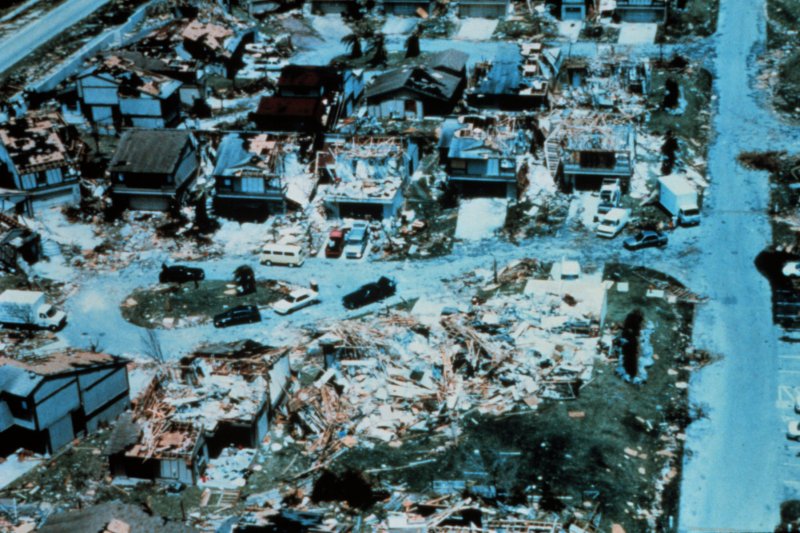1 of 2 | Hurricane Andrew caused $26.5 billion in damage in the United States and killed 65 people in the United States and Bahamas. File Photo courtesy of NOAA
Aug. 24 (UPI) -- In the early hours of Aug. 24, 1992, Hurricane Andrew made landfall on Florida's southeastern shore, packing winds up to 175 mph that would eventually destroy tens of thousands of homes and cause $26.5 billion in damage.
The powerful Category 5 storm ultimately killed 65 people in the Bahamas and the U.S. states of Florida and Louisiana over its 12-day lifespan.
Millions of people across the Southeast had a story to share about the day Hurricane Andrew upended their lives.
On the 25th anniversary of the devastating storm, here's a look back at a few of the stories UPI reporters gathered in the days after Andrew hit:
-- Among the hardest hit cities by Hurricane Andrew was Homestead. There, City Manager Alex Muxo said about 90 percent of city employees lost their homes, and though massive amounts of food, water and other supplies were donated, there was little mechanism in place for distribution.
"People were ready to take the guards' guns away from them to get the water. That's how desperate it is," Muxo told UPI.
He said volunteers couldn't reach residents to help them with supplies because many had run out of batteries.
"We felt the best way to get to people is to go door to door or rubble to rubble -- there's no door,
Muxo said.
-- For some, seeking desperately needed supplies sometimes meant shelling out the big bucks. Kathy Harvey told UPI one man tried to sell her a $1.89 can of Spam for $3 and another wanted $5 for a $1 bag of ice.
"Mister, I can't afford it," she said. "My food stamps got blown away.
"They're taking advantage of this disaster. Somebody needs to get them."
The Florida attorney general's office received reports of price gouging throughout the region, including $35 motel rooms going for $120, and rental companies asking $100 to $400 per day for rental trucks that normally cost $19 per day.
-- One Florida fisherman said he'd never forget the moment he watched his two friends die while trying to save a fishing boat. The then-28-year-old Stephen Suszek survived but was shipwrecked on Elliott Key in Biscayne Bay for a day.
He said he was helping Tommy Vann and Vann's stepfather, Capt. Gus Lorences transport their vessel to what they thought would be safer waters. But when the storm hit, Lorences was blown overboard.
"He was just gone. I couldn't see him anymore," Suszek said.
Then a 2-by-6-inch plank shot through the boat and decapitated Vann.
"There was nothing I could do. Water was coming over the whole boat," Suszek told UPI at the time. "I was thinking about me and I knew it was too late to do anything for Tommy. I let him go."
-- While thousands of South Florida homes were damaged or destroyed entirely, others were narrowly spared. Robert Herman, who lived in the Upper Keys, said he escaped the brunt of the storm.
"One degree [latitude] and we would have got it all," he told UPI. "We were blessed. We didn't dodge a bullet, we dodged an atomic bomb."
-- For some children, the destruction of Hurricane Andrew was particularly terrifying. For Rachel Fabelo, then 29, a stay at a Miami shelter meant more than just worrying about how to restart. She also had to worry about how the storm impacted her daughter's emotional well-being.
"When are we gonna have a new start? Who's gonna help us? How long is it gonna take? How much longer do we have to put up living like this?" Fabelo asked a UPI reporter after losing her Cutler Ridge home south of Miami.
Her 8-year-old daughter, Janeris Fabelo, worried about her dog, Chilly, and her bird, Coli.
"I keep thinking how bad it's gonna be when he comes back again," the youngster said. "He" was Hurricane Andrew.
-- It was to seek protection for their children that some families ultimately moved into tent cities throughout Dade County, including one at Harris Field in Homestead.
Olga Valle told UPI she, her husband and their two children moved into a tent at the location after a spider bit her daughter on the leg.
"We were sleeping in the truck. It's much better to sleep in this place," she said of the 108 tents at Harris Field.
Carolyn Kendrick said at the time she was considering moving to the tent city after rats became a problem at her devastated house in Homestead where she lived with her husband, four children and four grandchildren.
"We gotta put boards out to keep the rats from biting the babies," she said.
Damage from an F3 tornado spawned by Hurricane Andrew in LaPlace, Louisiana. File Photo courtesy of NOAA
-- Andrew made landfall on the southern coast of Louisiana on Aug. 26, 1992, near Morgan City. Four feet of water flooded the streets of Lisa Park subdivision in northern Houma. The storm also knocked out power and a tornado damaged one home in Terrebonne Parish.
"We are hot and miserable, but we're learning to cope with it," said Addie Dean, 17, a senior at Terrebonne High School. "We are Mother Nature's prisoners."



















